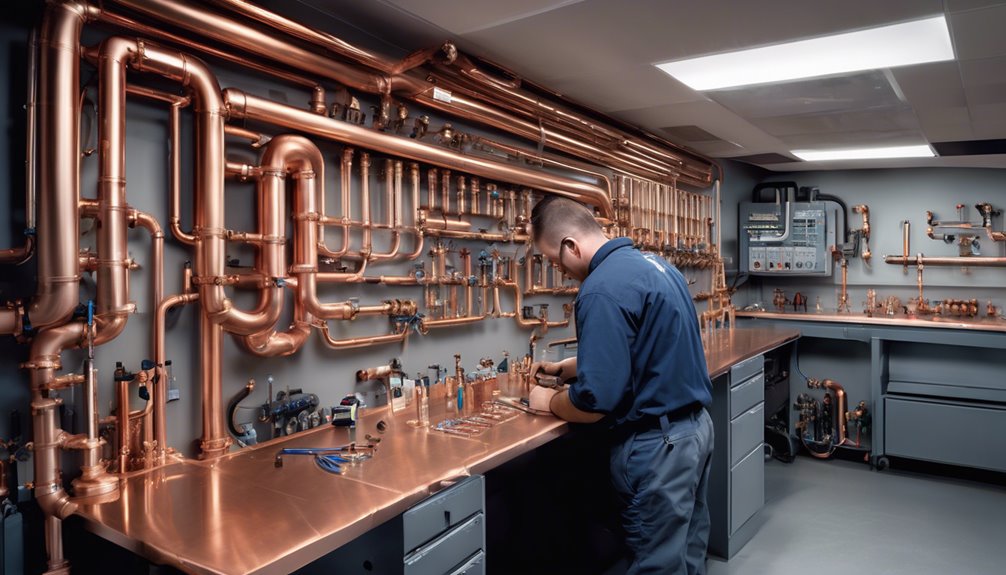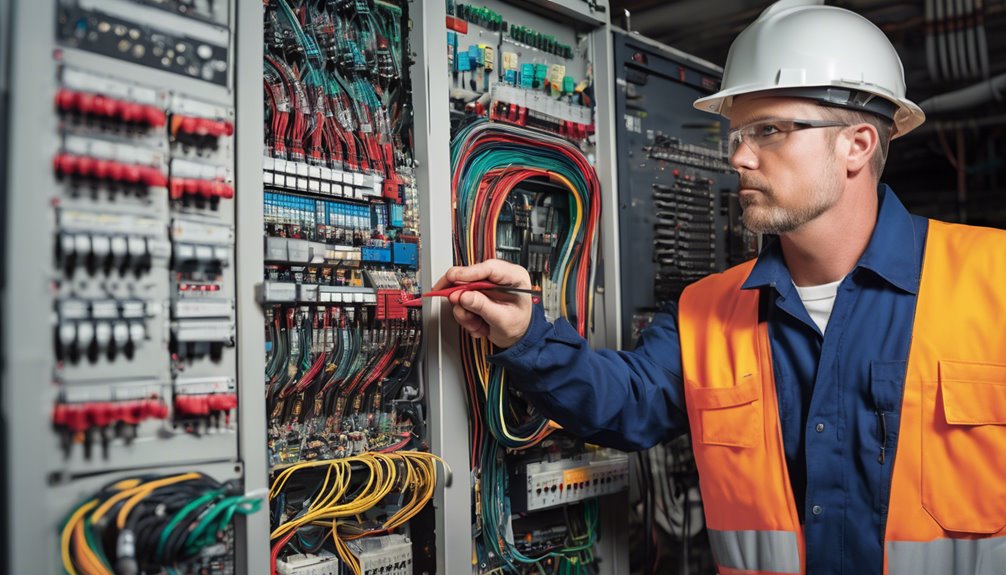Get an Instant Quote on Contracting, Plumbing, Electrical HVAC Contractor Bond
In the contracting, plumbing, electrical, and HVAC sectors, compliance isn’t just a checklist—it’s crucial for safety and efficiency. You need to stay updated on various regulations and standards that govern your work. Ignoring these can lead to costly fines and safety hazards. So, how can you ensure your operations align with the latest compliance requirements? Let’s explore the key aspects that could make or break your business.
Understanding Compliance Regulations in the Construction Industry

When you dive into the construction industry, understanding compliance regulations is crucial for ensuring project success. Compliance isn’t just a legal requirement; it’s a way to protect your team, clients, and the reputation of your business.
Familiarize yourself with local, state, and federal regulations that apply to your projects. These rules often cover safety standards, environmental impacts, and labor practices. Keeping up-to-date with changes in regulations can prevent costly delays and fines.
Make it a habit to review compliance requirements regularly and consider training sessions for your team. By prioritizing compliance, you not only meet legal obligations but also build trust with clients and stakeholders, setting a solid foundation for future projects.
Key Compliance Standards for Plumbing Professionals

When you’re working as a plumbing professional, understanding local plumbing codes is crucial for your projects.
You’ll also need to ensure compliance with safety regulations to protect yourself and your clients.
Let’s explore these key standards to keep your work up to par.
Local Plumbing Codes
Local plumbing codes are essential standards that every plumbing professional must understand and adhere to.
These codes govern everything from the types of materials you can use to the installation methods required for various systems. You need to familiarize yourself with your local regulations, as they can differ significantly from one area to another.
Compliance ensures not only the safety and efficiency of your plumbing work but also protects you from legal repercussions. Staying updated on any changes in local codes is crucial, as municipalities frequently revise their regulations.
Make sure you’re always in the loop and maintain proper documentation to prove compliance. By doing so, you’ll enhance your reputation and ensure the satisfaction of your clients.
Safety Regulations Compliance
Understanding and adhering to safety regulations is crucial for plumbing professionals to protect both themselves and their clients.
You need to familiarize yourself with OSHA guidelines and local safety codes, which set the standards for safe work practices. Always wear appropriate personal protective equipment, like gloves and goggles, to reduce the risk of injury.
Make sure your tools and equipment are well-maintained and inspected regularly. Additionally, proper training in handling hazardous materials is essential to avoid accidents.
Regularly review safety protocols with your team to ensure everyone stays informed. By prioritizing safety compliance, you not only enhance your reputation but also foster trust with your clients, ensuring a successful and sustainable plumbing business.
Electrical Safety Codes and Compliance Requirements

Electrical safety codes and compliance requirements play a crucial role in ensuring the safety of both workers and the public.
As a contractor, you need to familiarize yourself with the National Electrical Code (NEC) and local regulations that govern installation, maintenance, and inspection processes. Following these codes helps prevent accidents, reduce liability, and ensure a safe working environment.
Regularly inspect your work for compliance with these standards, and don’t hesitate to consult with licensed electricians when needed.
Additionally, staying updated on changes to the codes is essential, as they evolve to meet new safety challenges.
Ultimately, adhering to electrical safety codes not only protects lives but also boosts your credibility as a responsible contractor.
HVAC Regulations: Ensuring Energy Efficiency and Safety
As you navigate the complexities of HVAC regulations, it’s vital to prioritize both energy efficiency and safety in your projects. Familiarizing yourself with local codes ensures you meet the minimum requirements for installation and maintenance.
Emphasizing energy efficiency not only reduces operating costs for your clients but also contributes to environmental sustainability. Utilize ENERGY STAR-rated equipment and consider implementing smart technologies that optimize energy use.
Safety is equally crucial; always check for proper ventilation and refrigerant handling to avoid hazardous situations. Regular inspections and maintenance help you stay compliant and protect your reputation.
Common Compliance Violations and How to Avoid Them
When it comes to contractor compliance, understanding common violations can save you headaches down the line.
You need to be aware of licensing requirements, the importance of safety standards, and the permitting process to keep your projects on track.
Let’s explore how to avoid these pitfalls and ensure smooth operations.
Licensing Requirements Explained
Understanding licensing requirements is crucial for contractors, not only to ensure compliance but also to avoid common pitfalls that can hinder your business. Each state has specific licensing regulations that you must adhere to, so familiarize yourself with local laws.
Double-check that you hold the necessary licenses for your trade, whether electrical, plumbing, or HVAC. Often, failure to renew licenses on time can lead to fines or work stoppages. Keep detailed records of your licenses and their expiration dates.
Additionally, ensure your employees have the required certifications. By staying informed and organized, you can avoid violations that may damage your reputation and financial stability. Always consult with local authorities if you’re unsure about any requirements.
Safety Standards Importance
Safety standards play a vital role in protecting both workers and the public, making compliance essential for contractors. Ignoring these standards can lead to serious accidents, costly fines, and damage to your reputation.
To avoid common compliance violations, focus on the following:
- Training: Ensure all employees receive proper safety training for their specific tasks.
- Personal Protective Equipment (PPE): Always provide and enforce the use of appropriate PPE for your team.
- Hazard Communication: Keep clear labels and safety data sheets for all hazardous materials on-site.
- Regular Inspections: Conduct routine inspections to identify and rectify potential safety hazards before they escalate.
Permitting Process Overview
Navigating the permitting process is a key component of contractor compliance that directly impacts project timelines and overall success.
To avoid common compliance violations, start by thoroughly understanding local regulations and requirements. Ensure you submit complete applications, as missing documents can lead to delays or rejections.
It’s crucial to double-check that all work aligns with the approved plans. Communicate regularly with permitting officials; they can provide guidance and clarify any uncertainties.
Additionally, stay updated on changes in laws and codes, as they can affect your projects. By proactively managing these aspects, you’ll minimize the risk of violations and keep your projects on track, ultimately enhancing your reputation as a reliable contractor.
Best Practices for Maintaining Compliance in Your Business
While staying compliant might seem overwhelming at times, implementing best practices can simplify the process and help your business thrive.
Here are four essential practices to consider:
- Stay Informed: Regularly review local and federal regulations to ensure you’re up-to-date.
- Document Everything: Keep detailed records of permits, inspections, and compliance-related communications.
- Use Checklists: Develop compliance checklists for projects to ensure all necessary steps are followed.
- Engage Professionals: Hire compliance experts when necessary to navigate complex regulations and avoid costly mistakes.
The Role of Training and Certification in Compliance Success
Effective compliance isn’t just about following regulations; it’s also about equipping your team with the knowledge and skills they need to succeed. Training and certification play a crucial role in this process.
When your team understands the latest industry standards and safety protocols, they’re better prepared to meet compliance requirements. Investing in training helps identify potential risks and fosters a culture of accountability.
Certifications not only validate your team’s expertise but also build client trust. Regular workshops and refresher courses keep everyone updated on any regulatory changes.
Frequently Asked Questions
What Are the Penalties for Non-Compliance in Contracting Work?
If you don’t comply with regulations, you could face hefty fines, project delays, or even license suspension. It’s crucial to stay informed and ensure your work meets all necessary standards to avoid these penalties.
How Often Should Compliance Training Be Conducted?
You should conduct compliance training regularly, ideally annually, to keep everyone updated on the latest regulations. Frequent sessions also help reinforce the importance of compliance and ensure that everyone stays informed and engaged in best practices.
Are There Specific Compliance Requirements for Small Contractors?
Yes, small contractors often face specific compliance requirements based on their industry, local regulations, and project types. You should familiarize yourself with these regulations to ensure your business operates legally and efficiently.
What Documentation Is Needed to Prove Compliance?
To prove compliance, you’ll need documentation like licenses, permits, inspection reports, and safety certifications. Keep everything organized and accessible, as it’ll help you demonstrate adherence to regulations and standards when required.
How Can Contractors Stay Updated on Compliance Changes?
To stay updated on compliance changes, you should regularly review industry publications, attend relevant workshops, and network with peers. Subscribing to newsletters and joining professional associations can also keep you informed about new regulations.
Conclusion
In conclusion, staying compliant in contracting, plumbing, electrical, and HVAC sectors is crucial for your success. By understanding regulations, adhering to safety codes, and avoiding common violations, you can protect your business and your clients. Regular training and documentation are key to maintaining compliance, building trust, and enhancing your reputation. Prioritize these practices, and you’ll not only avoid costly fines but also ensure your projects run smoothly and efficiently. Your commitment to compliance pays off in the long run!
